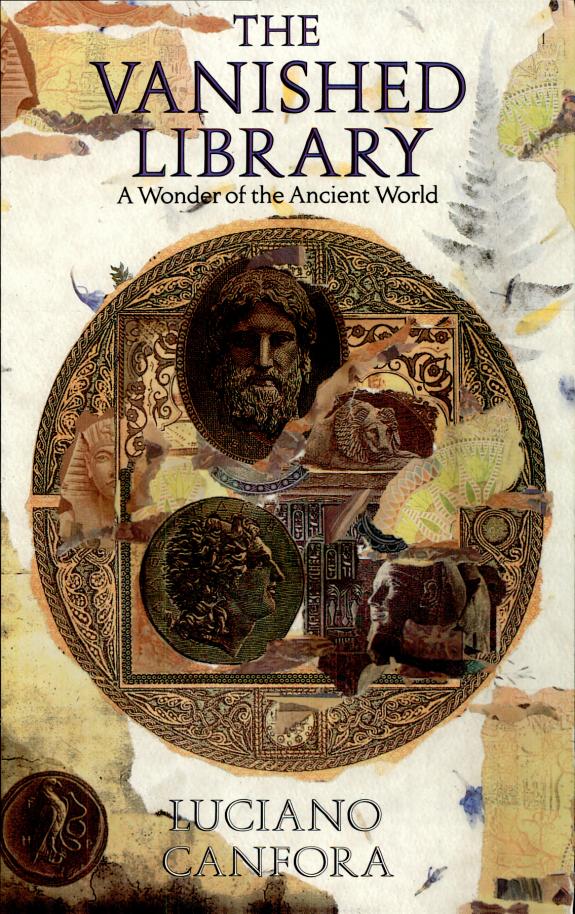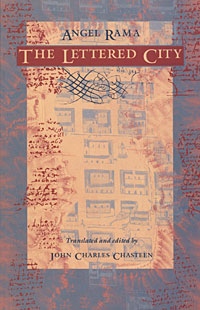Luciano Canfora: The Vanished Library: A Wonder of the Ancient World (1986–) [Italian, English]
Filed under book | Tags: · antiquity, book, knowledge, library

The Library of Alexandria, one of the wonders of the Ancient World, has haunted Western culture for over 2,000 years. The Ptolemaic kings of Egypt—successors of Alexander the Great—had a staggering ambition: to house all of the books ever written under one roof, and the story of the universal library and its destruction still has the power to move us.
But what was the library, and where was it? Did it exist at all? Contemporary descriptions are vague and contradictory. The fate of the precious books themselves is a subject of endless speculation.
Canfora resolves these puzzles in this unusual book. He recreates the world of Egypt and the Greeks in brief chapters that marry the craft of the novelist and the discipline of the historian. Anecdotes, conversations, and reconstructions give The Vanished Library the compulsion of an exotic tale, yet Canfora bases all of them on historical and literary sources, which he discusses with great panache. As the chilling conclusion to this elegant piece of historical detective work he establishes who burned the books.
Publisher Sellerio, Palermo, 1986
Sixth edition, 1990
203 pages
English edition
Translated by Martin Ryle
First published by Hutchinson Radius, 1989
Publisher University of California Press, 1990
ISBN 0520072553, 9780520072558
205 pages
Review (Julia Haig Gaisser, Bryn Mawr Classical Review, 1991)
Review (Hugh Lloyd-Jones, The New York Review of Books, 1990), Response
Review (Evelyn Edson, Vergilius, 1991)
Publisher (EN)
La biblioteca scomparsa (Italian, 6th edition, 1986/1990, 7 MB)
The Vanished Library (English, 1989/1990, 10 MB)
Angel Rama: The Lettered City (1984–) [Spanish, English]
Filed under book | Tags: · city, education, history, history of literature, language, latin america, literary theory, literature, space

“Angel Rama’s La ciudad letrada was published in 1984, shortly after he had died in a plane accident in Spain. Since then, it has quickly established itself as one of the most daring, perspicacious and innovative analyses of Latin American history, literature and political culture. However, because it was not completed due to his untimely death, the book was an incomplete synthesis of several decades of literary criticism and history. Even if Rama had not written La ciudad letrada, his place on the canon of Latin American letters would have been secured by his pioneering work on intra-American comparative literary studies. Rama, appropriating a term from Cuban anthropologist Fernando Ortiz, introduced into Latin American literary studies the term ‘transculturation’, which sought to conceptualize the interaction between indigenous, criollo and mestizo cultures in Latin America, and in this way he gave a hermeneutic key for unlocking many key texts of Latin American letters.
Rama’s book is surely about letters, literature and writing, but it is also about cities, space, spatialization and the relationship between the syntax of languages and the order of space. The book is, in fact, what one may call a philosophical-historical-cultural essay that uses literature and the ‘writer’–el letrado–to elaborate a wide-ranging interpretative thesis about Latin America as a cultural unit. Its genre is thus not a literary theory, comparative literature, or even cultural studies, even if it contributes to these. In German one calls this genre Geistesgeschichte, which is neither a spiritual nor an intellectual history, but rather a history of the animating logic of a culture.” (from a review by Eduardo Mendieta, City, 2006)
First published by Ediciones del Norte, Hanover/NH, 1984
With an Introduction by Hugo Achugar
Publisher Arca, Montevideo, 1998
ISBN 9974400244
126 pages
English edition
Translated and with an Introduction by John Charles Chasteen
Publisher Duke University Press, 1996
ISBN 0822317575, 9780822317579
141 pages
via Oral Majority
Commentary (Cora Gorman Malone, 2010, in EN)
Commentary (Brantley Nicholson, 2011, in EN)
Publisher (EN)
La ciudad letrada (Spanish, 1984/1998, 6 MB, no OCR)
The Lettered City (English, pages 40 and 56 missing, 1996, 9 MB, no OCR)
Naomi Klein: This Changes Everything: Capitalism vs. The Climate (2014)
Filed under book | Tags: · activism, agriculture, capitalism, climate, climate crisis, coal, economy, energy, gas, geoengineering, global warming, market, mining, oil, weather

In This Changes Everything Naomi Klein argues that climate change isn’t just another issue to be neatly filed between taxes and health care. It’s an alarm that calls us to fix an economic system that is already failing us in many ways. Klein meticulously builds the case for how massively reducing our greenhouse emissions is our best chance to simultaneously reduce gaping inequalities, re-imagine our broken democracies, and rebuild our gutted local economies. She exposes the ideological desperation of the climate-change deniers, the messianic delusions of the would-be geoengineers, and the tragic defeatism of too many mainstream green initiatives. And she demonstrates precisely why the market has not—and cannot—fix the climate crisis but will instead make things worse, with ever more extreme and ecologically damaging extraction methods, accompanied by rampant disaster capitalism.
Klein argues that the changes to our relationship with nature and one another that are required to respond to the climate crisis humanely should not be viewed as grim penance, but rather as a kind of gift—a catalyst to transform broken economic and cultural priorities and to heal long-festering historical wounds. And she documents the inspiring movements that have already begun this process: communities that are not just refusing to be sites of further fossil fuel extraction but are building the next, regeneration-based economies right now.
Publisher Simon & Schuster, 2014
ISBN 1451697384, 9781451697384
576 pages
Reviews: David L. Ulin (Los Angeles Times, 2014), Sandra Steingraber (EcoWatch, 2014).
Book website, Twitter, Facebook
Publisher
EPUB (updated on 2021-8-13)
PDF (updated on 2021-8-13)

